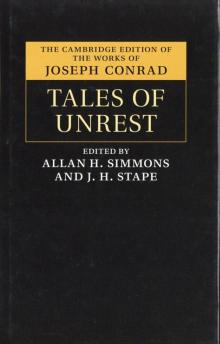- Home
- Joseph Conrad
Almayer's Folly Page 2
Almayer's Folly Read online
Page 2
He stepped cautiously on the loose planks towards the ladder. A lizard, disturbed by the noise, emitted a plaintive note and scurried through the long grass growing on the bank. Almayer descended the ladder carefully, now thoroughly recalled to the realities of life by the care necessary to prevent a fall on the uneven ground where the stones, decaying planks, and half−sawn beams were piled up in inextricable confusion. As Almayer's Folly
4
Almayer's Folly
he turned towards the house where he lived−−"my old house" he called it−− his ear detected the splash of paddles away in the darkness of the river. He stood still in the path, attentive and surprised at anybody being on the river at this late hour during such a heavy freshet. Now he could hear the paddles distinctly, and even a rapidly exchanged word in low tones, the heavy breathing of men fighting with the current, and hugging the bank on which he stood. Quite close, too, but it was too dark to distinguish anything under the overhanging bushes.
"Arabs, no doubt," muttered Almayer to himself, peering into the solid blackness. "What are they up to now?
Some of Abdulla's business; curse him!"
The boat was very close now.
"Oh, ya! Man!" hailed Almayer.
The sound of voices ceased, but the paddles worked as furiously as before. Then the bush in front of Almayer shook, and the sharp sound of the paddles falling into the canoe rang in the quiet night. They were holding on to the bush now; but Almayer could hardly make out an indistinct dark shape of a man's head and shoulders above the bank.
"You Abdulla?" said Almayer, doubtfully.
A grave voice answered−−
"Tuan Almayer is speaking to a friend. There is no Arab here."
Almayer's heart gave a great leap.
"Dain!" he exclaimed. "At last! at last! I have been waiting for you every day and every night. I had nearly given you up."
"Nothing could have stopped me from coming back here," said the other, almost violently. "Not even death,"
he whispered to himself.
"This is a friend's talk, and is very good," said Almayer, heartily. "But you are too far here. Drop down to the jetty and let your men cook their rice in my campong while we talk in the house."
There was no answer to that invitation.
"What is it?" asked Almayer, uneasily. "There is nothing wrong with the brig, I hope?"
"The brig is where no Orang Blanda can lay his hands on her," said Dain, with a gloomy tone in his voice, which Almayer, in his elation, failed to notice.
"Right," he said. "But where are all your men? There are only two with you."
"Listen, Tuan Almayer," said Dain. "To−morrow's sun shall see me in your house, and then we will talk.
Now I must go to the Rajah."
"To the Rajah! Why? What do you want with Lakamba?"
"Tuan, to−morrow we talk like friends. I must see Lakamba to−night."
Almayer's Folly
5
Almayer's Folly
"Dain, you are not going to abandon me now, when all is ready?" asked Almayer, in a pleading voice.
"Have I not returned? But I must see Lakamba first for your good and mine."
The shadowy head disappeared abruptly. The bush, released from the grasp of the bowman, sprung back with a swish, scattering a shower of muddy water over Almayer, as he bent forward, trying to see.
In a little while the canoe shot into the streak of light that streamed on the river from the big fire on the opposite shore, disclosing the outline of two men bending to their work, and a third figure in the stern flourishing the steering paddle, his head covered with an enormous round hat, like a fantastically exaggerated mushroom.
Almayer watched the canoe till it passed out of the line of light. Shortly after the murmur of many voices reached him across the water. He could see the torches being snatched out of the burning pile, and rendering visible for a moment the gate in the stockade round which they crowded. Then they went in apparently. The torches disappeared, and the scattered fire sent out only a dim and fitful glare.
Almayer stepped homewards with long strides and mind uneasy. Surely Dain was not thinking of playing him false. It was absurd. Dain and Lakamba were both too much interested in the success of his scheme. Trusting to Malays was poor work; but then even Malays have some sense and understand their own interest. All would be well−−must be well. At this point in his meditation he found himself at the foot of the steps leading to the verandah of his home. From the low point of land where he stood he could see both branches of the river. The main branch of the Pantai was lost in complete darkness, for the fire at the Rajah's had gone out altogether; but up the Sambir reach his eye could follow the long line of Malay houses crowding the bank, with here and there a dim light twinkling through bamboo walls, or a smoky torch burning on the platforms built out over the river. Further away, where the island ended in a low cliff, rose a dark mass of buildings towering above the Malay structures. Founded solidly on a firm ground with plenty of space, starred by many lights burning strong and white, with a suggestion of paraffin and lamp−glasses, stood the house and the godowns of Abdulla bin Selim, the great trader of Sambir. To Almayer the sight was very distasteful, and he shook his fist towards the buildings that in their evident prosperity looked to him cold and insolent, and contemptuous of his own fallen fortunes.
He mounted the steps of his house slowly.
In the middle of the verandah there was a round table. On it a paraffin lamp without a globe shed a hard glare on the three inner sides. The fourth side was open, and faced the river. Between the rough supports of the high−pitched roof hung torn rattan screens. There was no ceiling, and the harsh brilliance of the lamp was toned above into a soft half−light that lost itself in the obscurity amongst the rafters. The front wall was cut in two by the doorway of a central passage closed by a red curtain. The women's room opened into that passage, which led to the back courtyard and to the cooking shed. In one of the side walls there was a doorway. Half obliterated words−−"Office: Lingard and Co."−−were still legible on the dusty door, which looked as if it had not been opened for a very long time. Close to the other side wall stood a bent−wood rocking−chair, and by the table and about the verandah four wooden armchairs straggled forlornly, as if ashamed of their shabby surroundings. A heap of common mats lay in one corner, with an old hammock slung diagonally above. In the other corner, his head wrapped in a piece of red calico, huddled into a shapeless heap, slept a Malay, one of Almayer's domestic slaves−−"my own people," he used to call them. A numerous and representative assembly of moths were holding high revels round the lamp to the spirited music of swarming mosquitoes.
Under the palm−leaf thatch lizards raced on the beams calling softly. A monkey, chained to one of the verandah supports−−retired for the night under the eaves−− peered and grinned at Almayer, as it swung to one of the bamboo roof sticks and caused a shower of dust and bits of dried leaves to settle on the shabby table. The floor was uneven, with many withered plants and dried earth scattered about. A general air of Almayer's Folly
6
Almayer's Folly
squalid neglect pervaded the place. Great red stains on the floor and walls testified to frequent and indiscriminate betel−nut chewing. The light breeze from the river swayed gently the tattered blinds, sending from the woods opposite a faint and sickly perfume as of decaying flowers.
Under Almayer's heavy tread the boards of the verandah creaked loudly. The sleeper in the corner moved uneasily, muttering indistinct words. There was a slight rustle behind the curtained doorway, and a soft voice asked in Malay, "Is it you, father?"
"Yes, Nina. I am hungry. Is everybody asleep in this house?"
Almayer spoke jovially and dropped with a contented sigh into the armchair nearest to the table. Nina Almayer came through the curtained doorway followed by an old Malay woman, who busied herself in setting upon the table a plateful of rice and fish, a jar of water,
and a bottle half full of genever. After carefully placing before her master a cracked glass tumbler and a tin spoon she went away noiselessly. Nina stood by the table, one hand lightly resting on its edge, the other hanging listlessly by her side. Her face turned towards the outer darkness, through which her dreamy eyes seemed to see some entrancing picture, wore a look of impatient expectancy. She was tall for a half−caste, with the correct profile of the father, modified and strengthened by the squareness of the lower part of the face inherited from her maternal ancestors−−the Sulu pirates. Her firm mouth, with the lips slightly parted and disclosing a gleam of white teeth, put a vague suggestion of ferocity into the impatient expression of her features. And yet her dark and perfect eyes had all the tender softness of expression common to Malay women, but with a gleam of superior intelligence; they looked gravely, wide open and steady, as if facing something invisible to all other eyes, while she stood there all in white, straight, flexible, graceful, unconscious of herself, her low but broad forehead crowned with a shining mass of long black hair that fell in heavy tresses over her shoulders, and made her pale olive complexion look paler still by the contrast of its coal−black hue.
Almayer attacked his rice greedily, but after a few mouthfuls he paused, spoon in hand, and looked at his daughter curiously.
"Did you hear a boat pass about half an hour ago Nina?" he asked.
The girl gave him a quick glance, and moving away from the light stood with her back to the table.
"No," she said, slowly.
"There was a boat. At last! Dain himself; and he went on to Lakamba. I know it, for he told me so. I spoke to him, but he would not come here to−night. Will come to−morrow, he said."
He swallowed another spoonful, then said−−
"I am almost happy to−night, Nina. I can see the end of a long road, and it leads us away from this miserable swamp. We shall soon get away from here, I and you, my dear little girl, and then −−"
He rose from the table and stood looking fixedly before him as if contemplating some enchanting vision.
"And then," he went on, "we shall be happy, you and I. Live rich and respected far from here, and forget this life, and all this struggle, and all this misery!"
He approached his daughter and passed his hand caressingly over her hair.
Almayer's Folly
7
Almayer's Folly
"It is bad to have to trust a Malay," he said, "but I must own that this Dain is a perfect gentleman−−a perfect gentleman," he repeated.
"Did you ask him to come here, father?" inquired Nina, not looking at him.
"Well, of course. We shall start on the day after to−morrow," said Almayer, joyously. "We must not lose any time. Are you glad, little girl?"
She was nearly as tall as himself, but he liked to recall the time when she was little and they were all in all to each other.
"I am glad," she said, very low.
"Of course," said Almayer, vivaciously, "you cannot imagine what is before you. I myself have not been to Europe, but I have heard my mother talk so often that I seem to know all about it. We shall live a−−a glorious life. You shall see."
Again he stood silent by his daughter's side looking at that enchanting vision. After a while he shook his clenched hand towards the sleeping settlement.
"Ah! my friend Abdulla," he cried, "we shall see who will have the best of it after all these years!"
He looked up the river and remarked calmly:
"Another thunderstorm. Well! No thunder will keep me awake to−night, I know! Good−night, little girl," he whispered, tenderly kissing her cheek. "You do not seem to be very happy to−night, but to−morrow you will show a brighter face. Eh?"
Nina had listened to her father with her face unmoved, with her half−closed eyes still gazing into the night now made more intense by a heavy thunder−cloud that had crept down from the hills blotting out the stars, merging sky, forest, and river into one mass of almost palpable blackness. The faint breeze had died out, but the distant rumble of thunder and pale flashes of lightning gave warning of the approaching storm. With a sigh the girl turned towards the table.
Almayer was in his hammock now, already half asleep.
"Take the lamp, Nina," he muttered, drowsily. "This place is full of mosquitoes. Go to sleep, daughter."
But Nina put the lamp out and turned back again towards the balustrade of the verandah, standing with her arm round the wooden support and looking eagerly towards the Pantai reach. And motionless there in the oppressive calm of the tropical night she could see at each flash of lightning the forest lining both banks up the river, bending before the furious blast of the coming tempest, the upper reach of the river whipped into white foam by the wind, and the black clouds torn into fantastic shapes trailing low over the swaying trees.
Round her all was as yet stillness and peace, but she could hear afar off the roar of the wind, the hiss of heavy rain, the wash of the waves on the tormented river. It came nearer and nearer, with loud thunder−claps and long flashes of vivid lightning, followed by short periods of appalling blackness. When the storm reached the low point dividing the river, the house shook in the wind, and the rain pattered loudly on the palm−leaf roof, the thunder spoke in one prolonged roll, and the incessant lightning disclosed a turmoil of leaping waters, driving logs, and the big trees bending before a brutal and merciless force.
Almayer's Folly
8
Almayer's Folly
Undisturbed by the nightly event of the rainy monsoon, the father slept quietly, oblivious alike of his hopes, his misfortunes, his friends, and his enemies; and the daughter stood motionless, at each flash of lightning eagerly scanning the broad river with a steady and anxious gaze.
CHAPTER II.
When, in compliance with Lingard's abrupt demand, Almayer consented to wed the Malay girl, no one knew that on the day when the interesting young convert had lost all her natural relations and found a white father, she had been fighting desperately like the rest of them on board the prau, and was only prevented from leaping overboard, like the few other survivors, by a severe wound in the leg. There, on the fore−deck of the prau, old Lingard found her under a heap of dead and dying pirates, and had her carried on the poop of the Flash before the Malay craft was set on fire and sent adrift. She was conscious, and in the great peace and stillness of the tropical evening succeeding the turmoil of the battle, she watched all she held dear on earth after her own savage manner, drift away into the gloom in a great roar of flame and smoke. She lay there unheeding the careful hands attending to her wound, silent and absorbed in gazing at the funeral pile of those brave men she had so much admired and so well helped in their contest with the redoubtable "Rajah−Laut."
The light night breeze fanned the brig gently to the southward, and the great blaze of light got smaller and smaller till it twinkled only on the horizon like a setting star. It set: the heavy canopy of smoke reflected the glare of hidden flames for a short time and then disappeared also.
She realised that with this vanishing gleam her old life departed too. Thenceforth there was slavery in the far countries, amongst strangers, in unknown and perhaps terrible surroundings. Being fourteen years old, she realised her position and came to that conclusion, the only one possible to a Malay girl, soon ripened under a tropical sun, and not unaware of her personal charms, of which she heard many a young brave warrior of her father's crew express an appreciative admiration. There was in her the dread of the unknown; otherwise she accepted her position calmly, after the manner of her people, and even considered it quite natural; for was she not a daughter of warriors, conquered in battle, and did she not belong rightfully to the victorious Rajah?
Even the evident kindness of the terrible old man must spring, she thought, from admiration for his captive, and the flattered vanity eased for her the pangs of sorrow after such an awful calamity. Perhaps had she known of the high walls, the quiet gardens, and the silent nuns of th
e Samarang convent, where her destiny was leading her, she would have sought death in her dread and hate of such a restraint. But in imagination she pictured to herself the usual life of a Malay girl−−the usual succession of heavy work and fierce love, of intrigues, gold ornaments, of domestic drudgery, and of that great but occult influence which is one of the few rights of half−savage womankind. But her destiny in the rough hands of the old sea−dog, acting under unreasoning impulses of the heart, took a strange and to her a terrible shape. She bore it all−−the restraint and the teaching and the new faith−−with calm submission, concealing her hate and contempt for all that new life.
She learned the language very easily, yet understood but little of the new faith the good sisters taught her, assimilating quickly only the superstitious elements of the religion. She called Lingard father, gently and caressingly, at each of his short and noisy visits, under the clear impression that he was a great and dangerous power it was good to propitiate. Was he not now her master? And during those long four years she nourished a hope of finding favour in his eyes and ultimately becoming his wife, counsellor, and guide.
Those dreams of the future were dispelled by the Rajah Laut's "fiat," which made Almayer's fortune, as that young man fondly hoped. And dressed in the hateful finery of Europe, the centre of an interested circle of Batavian society, the young convert stood before the altar with an unknown and sulky−looking white man.
For Almayer was uneasy, a little disgusted, and greatly inclined to run away. A judicious fear of the adopted father−in−law and a just regard for his own material welfare prevented him from making a scandal; yet, while swearing fidelity, he was concocting plans for getting rid of the pretty Malay girl in a more or less distant future. She, however, had retained enough of conventual teaching to understand well that according to white men's laws she was going to be Almayer's companion and not his slave, and promised to herself to act CHAPTER II.

 Heart of Darkness
Heart of Darkness Lord Jim
Lord Jim The Nigger of the Narcissus (Echo Library)
The Nigger of the Narcissus (Echo Library) Victory (Dover Thrift Editions)
Victory (Dover Thrift Editions) Secret Agent
Secret Agent Nostromo
Nostromo Chance: A Tale in Two Parts
Chance: A Tale in Two Parts Youth
Youth Almayer's Folly
Almayer's Folly The Heart of Darkness and the Secret Sharer
The Heart of Darkness and the Secret Sharer The Arrow of Gold: A Story Between Two Notes
The Arrow of Gold: A Story Between Two Notes The Rescue: A Romance of the Shallows
The Rescue: A Romance of the Shallows The Point Of Honor: A Military Tale
The Point Of Honor: A Military Tale Tales of Unrest
Tales of Unrest Under Western Eyes
Under Western Eyes Gaspar Ruiz
Gaspar Ruiz A Set of Six
A Set of Six Heart of Darkness and the Congo Diary (Penguin Classics)
Heart of Darkness and the Congo Diary (Penguin Classics) Heart of Darkness and Selected Short Fiction
Heart of Darkness and Selected Short Fiction Typhoon
Typhoon Youth, a Narrative
Youth, a Narrative Tomorrow
Tomorrow The Arrow of Gold
The Arrow of Gold The Shadow Line: A Confession
The Shadow Line: A Confession The Rescue
The Rescue Victory (Echo Library)
Victory (Echo Library) The Brute
The Brute Romance
Romance A Personal Record
A Personal Record Lord Jim: A Tale
Lord Jim: A Tale Heart of Darkness and Selected Short Fiction (Barnes & Noble Classics Series)
Heart of Darkness and Selected Short Fiction (Barnes & Noble Classics Series) Within the Tides
Within the Tides The Secret Sharer and Other Stories
The Secret Sharer and Other Stories Falk
Falk Heart of Darkness and The Secret Sharer
Heart of Darkness and The Secret Sharer Chance
Chance An Anarchist
An Anarchist The Secret Agent: A Simple Tale
The Secret Agent: A Simple Tale The Secret Agent
The Secret Agent Complete Works of Joseph Conrad (Illustrated)
Complete Works of Joseph Conrad (Illustrated) Heart of Darkness and the Congo Diary
Heart of Darkness and the Congo Diary Notes on Life & Letters
Notes on Life & Letters Typhoon (Single Story)
Typhoon (Single Story)